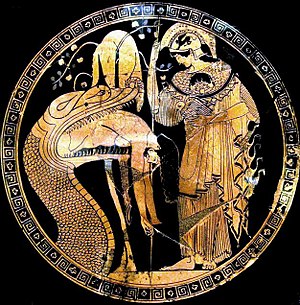….. In surveying references to angels during this time, one of the most common features in the names of angels is the appearance of the element of ‘el’.53 This survey reveals that the most common angelic characters of this period were named Michael, Gabriel, Sariel/Uriel, and Raphael.54 In other words, a prosopographical analysis of the names of the particular angels known to Jews in the Second Temple period shows that the name Jesus does not conform to the way angelic beings were designated as such. Because the name Jesus is never associated with an angelic figure, nor does the name conform to tropes of celestial beings within Judaism, Carrier’s assertions are unconvincing.55
Furthermore, studies of Second Temple names found in Jewish texts, ossuaries, and inscriptions only associate the name Jesus with human figures. The name Jesus was so common and widespread it was one of the six most popular names for Jewish males.56 This commonality is particularly on display when Josephus distinguishes between the different Jesus figures of the period, such as Jesus, son of Gamaliel, who served as high priest during the Maccabean period, as well as Jesus, son of Daminos, who served as high priest in 62-63 ce, only to be succeeded by Jesus, son of Sapphias, who served from 64-65 ce. Similarly, within early Christian literature, Jesus’ name and the power associated with it is presented as Jesus the Christ (Ιησούς Χριστός)’, likewise distinguishing him from the other Jesus figures of the time.57 Carrier’s argument does not adequately explain why an angelic figure would have a name so commonly associated with human beings, let alone one which does not conform to typical angelic naming conventions. At no point does an angel or celestial being called Jesus appear within Second Temple Judaism, and Jesus’ exhibits all the signs of a mundane name given to a human Jewish male within the period.
Gullotta, D. N. (2017). On Richard Carrier’s Doubts. Journal for the Study of the Historical Jesus, 15(2–3), 310–346. https://doi.org/10.1163/17455197-0150200 pp. 326-328
That sounds like a reason to be very cautious about accepting a hypothesis that a divinity would be named Jesus but it is also a double sided coin. The fact is that Jews did accept the name Jesus for a divinity or supernaturally exalted being worthy of worship. We know early Christians were quite capable of assigning a new name to a person to indicate a significant change of role or status. What if the historical Jesus had been named Simon (the most common male Jewish name of the time) or Joseph or John? How likely are they to have felt comfortable singing the praises of Dear John or Joe, John Christ, Simon Christ? If we imagine that living with even more common names than Jesus identifying their heavenly Christ then what are we to make of them sticking with Jesus even though that was one of the top half dozen most ordinary names known?

Sometimes a discipline can benefit from injection of new ideas from another field of study and I think a way out of the above conundrum is to be found in a 2011 Histos article by the classicist John Moles, Jesus the Healer in the Gospels, the Acts of the Apostles, and Early Christianity.
I have discussed Moles’ article before at
and
The full text of the 66 page article is available at the above link to the title Jesus the Healer.
The classicist was not a mythicist, but in the abstract to his article he did talk about the mutual benefits of closer interdisciplinary efforts between the Classics and Biblical Studies departments:
Abstract. This paper argues that the Gospels and Acts of the Apostles contain sustained and substantial punning on the name of ‘Jesus’ as ‘healer’ and explores the implications for the following: the interpretation and appreciation of these texts, including the question of whether (if at all) they function as Classical texts and the consequences of an affirmative (however qualified): present-day Classicists should be able to ‘speak to them’ and they in turn should ‘respond’ to such Classical addresses, to the benefit not only of New Testament scholarship but also of Classicists, who at a stroke acquire five major new texts; the constituent traditions of these texts; the formation, teaching, mission, theology, and political ideology of the early Jesus movement, and its participation in a wider, public, partly textual, and political debate about the claims of Christianity; and the healing element of the historical Jesus’ ministry.

I won’t repeat the detail I covered in my earlier posts but will mention just a few items that hopefully will encourage interested readers to consult the originals. Moles points out the importance of puns in this context:
Much scholarship over the last four decades has demonstrated the importance of puns and name puns in Classical societies, cultures and literatures, including historiography and biography. (p. 125)
Moles discusses in some detail the significance and role of the god and hero Jason in Hellenistic Greek culture. Jason was a healer and a type of dying and rising (through the mouth of a serpent) god. Jesus is the Jewish equivalent the name Jason:
The Palestinian Jewish Jesus bore the very popular name ישוע (‘Joshua’), which means something like ‘Yahweh [or ‘Yah’—shortened form] saves’.45 The Jewish-Greek form of the name, found in the NT, is ‘Ιησούς, whence our ‘Jesus’. Bilingual and etymological puns on the meaning of ‘Joshua’/’Ιησούς as ‘Yahweh saves’, alike in the Gospels and Acts (as we shall see), and in the letters of Paul and of others in the NT, are clear and acknowledged in some of the more linguistically alert scholarship.46 But there is a crucial additional factor: Jews who bore the name ישוע and wanted a straight Greek equivalent chose ‘Ιάσων (Ionic form Ίησων, modern ‘Jason’): an equivalence attested in official and governmental contexts.47 This Greek name actually means ‘healer’ (~ ίάομaι) and readily produces etymological puns.48 Jews who adopted Greek names generally tried to adopt ones nearest in form and meaning to the original. So not only do Ιησούς, the Greek-Jewish form of ‘Joshua’ and the name of a renowned Jewish ‘healer’, and ‘Ιάσων, the Greek form of ‘Ιησούς/’Joshua’ and a name which actually means ‘healer’, look similar and mean similar things: from a Hellenistic Jewish perspective, they are actually the same name, as any Jew with a modicum of Greek would have known.49 For us it is of course completely immaterial in this sort of context whether they are actually the same name.
There are also wider considerations. . . . (p. 127)
There is an inevitable link between the concepts of saving and healing, and Moles has much to say about the two names together. Example,
[Jason] derives from the pagan goddess of healing who is called Ίάσω (Ίήσω in Ionic) . . . Thus on the Greek side Ίάσων is a human name derived from a god’s: a theophoric name, just as on the Jewish side side ישוע is a human name derived from ‘Yahweh’. Furthermore, for the early Christians, this [Jesus] is in some sense, and to some degree, himself a divine figure. There is also a simple matter of sound. Ιησούς, Ίάσων and Ίάσω not only look very similar: they sound very similar. And the sound of names is very important. There is also a matter of extended meaning. There can be important links between ‘saving’, the basic meaning of ‘Joshua’, undeniably punned on in the NT, and ‘healing’, both at the levels of divine and qausi-divine and alike in medical, religious/social and political contexts. Given these links and the sound factor, one even wonders whether the many Greek speakers who knew that the Jewish god was denoted by ‘Yahweh’ or ‘Yah’ could also ‘hear’ both Ίη/σούς and Ίά/σων as ‘Yah saves’ directly, because -σοΰς and – σων could evoke σώζω and σώς, and whether bilingual speakers could even regard the Greek σώζω and the Hebrew verb as cognates.” (pp. 128-9)
I cannot set out all the detail here. Read the article. Except just one more, a gospel read through a classicist’s eyes:
Many Classicists nowadays, I think, would already feel that Mark’s dramatic and emphatic foregrounding of Jesus’ ‘healing ministry’ is underpinned by the very name of Jesus, which seems to be deployed both strategically (1.1, 9, 14, 17) and locally (1.24–5; 2.5, 8) in a telling way. The logic would be that the combination of Jesus’ much-repeated name, which means ‘healer’, with the lexicon of ‘tending’ and ‘cleanness’ and ‘uncleanness’ effects ‘punning by synonym’, a process further helped by the intrinsic importance attached to names (both of exorcist and demon) in exorcisms, whether Jewish or pagan. Certainly, in Mark, as in the others, use of Jesus’ name increases—sometimes dramatically—in healing contexts. By comparison with Classical texts (with which, as we have seen, Mark has some affinities), such punning would be quite elementary, naive even, by comparison with a text such as Pindar’s Fourth Pythian, which puns in subtle and allusive ways on ‘Jason’ as ‘healer’.
Back to our conundrum. . . . Continue reading “Was the name “Jesus” too common to belong to a divinity or archangel?”


